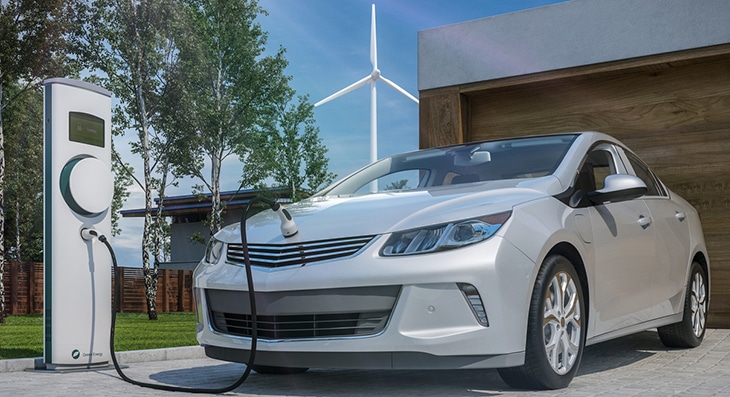Will an Electric Vehicle Add to Your Energy Bill?
Electric vehicles (EVs) have always had a prominent place in automotive history. Most people believe electric vehicles are a new trend, but the first automobiles were actually electric. Way back in the 1830s engineers in the U.S. and Europe were developing the first electric cars. They began to become more mainstream in the 1870s decades before Ford revolutionized the auto industry.
 Early electric vehicle owners weren’t necessarily worried about the environment, but they did like that there were benefits over steam and gas-powered automobiles. Urban and female drivers, in particular, liked that EVs were quiet, didn’t emit foul-smelling gasses and were easy to drive. Today’s drivers get all those same benefits and additional perks like tax credits.
Early electric vehicle owners weren’t necessarily worried about the environment, but they did like that there were benefits over steam and gas-powered automobiles. Urban and female drivers, in particular, liked that EVs were quiet, didn’t emit foul-smelling gasses and were easy to drive. Today’s drivers get all those same benefits and additional perks like tax credits.
It’s amazing to think that in the infancy of the electrical grid electric vehicles existed. Both the grid and electric vehicles have come a long way and become much more sophisticated. But one thing remains the same about electric vehicles – they need an electrical power supply to run!
Many drivers like the idea of owning an electric vehicle, but one of the few hesitations is concern over how it will affect their electric bill. The Department of Energy, Idaho National Laboratory, Edmunds and others have done extensive research on the matter. Here’s a look at what they found.
Quick Look at How Electric Vehicles Are Charged
Before we start breaking down the costs of the electric bill, let’s take a look at how EVs are charged. There are two methods:
Level 1 Charging – This is the standard 120-volt charging method. It takes longer but doesn’t require special electric vehicle supply equipment (EVSE) beyond the system that comes with the vehicle.
Level 2 Charging – This upgraded charging uses 240-volt circuits, which is much faster. This is the type of charging you’ll get with a dedicated EV charging station.
Will an Electric Vehicle Add to Your Electricity Bill?
The short answer is, yes. Any device, appliance or machine that draws electricity will add to your electric bill. Electric vehicles must be plugged-in and charged up regularly to run.
The real question is how much EV ownership will affect your overall electricity usage.
Cost Depends on Your Vehicle, Driving Needs and Electricity Rate
There are three primary variables that affect how much an electric vehicle will add to your electricity bill:
The Vehicle – Just like other electric products, some EVs are more efficient than others. Instead of MPG, electric vehicle mileage is measured as kilowatt-hours per 100 miles (kWh/100 miles). Another measurement is MPGe, which stands for miles per gallon equivalent. MPGe is calculated by estimating how far an EV can go using the amount of kWh that is equivalent to one gallon of gasoline. The EPA has estimated one gallon of gas to be 33.7-kilowatt hours (kWh). Yet another way to gauge efficiency is to look at how many kWhs it takes to fully charge up the battery and then divide that by the number of miles per full charge.
Check to see how many kWh it takes to go 100 miles for a better idea of how efficient an EV is. Luckily, there’s an easy way to compare the efficiency of electric vehicle models. Just head over to fueleconomy.gov and select all-electric or hybrid models for comparison. The EPA’s interactive electric vehicle label is also a handy resource. An EV label will tell you the range per charge, the annual “fuel” cost and how much you’ll save over five years compared to the average new vehicle.
Your Driving Needs – This one is pretty simple. The more miles you drive in a month, the higher your electricity use will be.
KWh Rate – Last but not least, is your kWh rate. Electricity rates are generally more stable than gasoline, especially if you have a fixed rate, long-term electric plan. However, rates do vary significantly from city to city. And if you live in a deregulated energy area, rates can vary from one provider to the next.
One other variable that could be a consideration is whether your plan has a separate EV charging rate. Suppliers that offer these plans typically charge less for EV charging. The one caveat is you need to have an EV charging station installed to separate the electricity use. A charging station can easily cost $1,000 or more.
When you drive an electric vehicle that’s drawing a lot of electricity you’ll want to make sure you get the best rate possible. Another thing to look for these days is whether or not you have a time-of-use electric plan. With this type of plan, electricity costs fluctuate throughout the day. Therefore the cost will be dramatically different depending on whether you plug the EV in for charging during peak, mid-peak or off-peak hours.
Regardless of your kWh rate and plan, many EV drivers find that electric fuel is still cheaper than gas.Learn more about how this would factory into your home energy plans
To limit the impact on your electric bill try to take advantage of free and low-cost public charging stations whenever possible. Many grocery stores, office complexes, government buildings, and schools now have at least a few in their parking lots. Bonus – you’ll also get a premium parking spot!
Need a more predictable energy plan for your electric vehicle? The Spark Energy Instant Boost plan is the perfect solution for higher use of customers. You pay one set price for up to 3,000 kWh of electricity each month. Learn more about the innovative Instant Boost plan from Spark Energy!Learn more about our electricity services.



